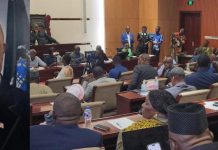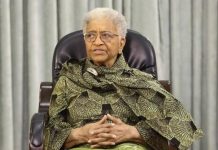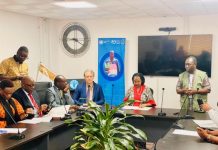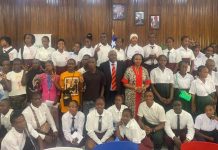Africa-Press – Liberia. Over 30 Liberian migrants deported from Algeria are crying out for urgent intervention from the Liberian government as they remain stranded in dire conditions at a transit camp in northern Niger.
The group, currently housed under the care of the International Organisation for Migration (IOM) in the desert town of Assamaka, say they have been abandoned and left to suffer in silence.
One of the migrants, George Dolo, shared their harrowing ordeal in a letter to FrontPage Africa, appealing for national attention and a swift repatriation process.
“We are not criminals. We are Liberians, sons and daughters, brothers and sisters, who simply wanted a better life. Now, all we ask is to be brought back home,” Dolo wrote.
The migrants, mostly young men and women, say they endured racism, abuse, and inhumane treatment in Algeria before being forcibly deported.
According to Dolo, the group was rounded up by Algerian authorities, detained without charges, and later abandoned in the desert at the Algeria-Niger border, a stretch notorious for its scorching heat and harsh terrain.
“We were beaten, locked up, and treated like animals. Then we were loaded into trucks and dumped in the desert,” Dolo said.
“Some of us thought we were going to die.”
Their rescue came only through the intervention of the IOM, which now hosts them at an overcrowded and under-resourced transit facility in Agadez.
Despite the organization’s efforts, Dolo says the living conditions are grim, with limited food, inadequate shelter, and growing health concerns among the migrants.
“Some of us are sick, traumatized, and mentally broken. We sleep in tents under the desert heat and rely on handouts to survive,” he added.
The most painful part, according to the migrants, is the lack of response from Liberian authorities.
Despite repeated attempts to contact the Liberian Embassy in Senegal, accredited to Niger, the Ministry of Foreign Affairs, and other government officials, Dolo says there has been no concrete response.
“We feel forgotten by the very country we call home,” the letter reads.
“Our families are waiting for us. Our children are waiting. We just want to go home.”
However, Assistant Minister for Public Affairs at the Ministry of Foreign Affairs, Saywah N. Gbaa, lamented that the stranded migrants should not portray the Ministry as being aware of their situation but unwilling to act.
“If they can reach out to the Ministry directly or the Embassy directly, then the Ministry can make a position on it,” Gbaa told FrontPage Africa on Wednesday, October 15, adding that the Ministry has not received any communication through its Embassy regarding such matters.
Meanwhile, Liberia’s Ambassador to Senegal, Ali Sylla, also stated that the Embassy in Dakar is unaware of the current case involving the stranded migrants in Niger.
“Nobody reached out to the Embassy in Dakar. The Embassy is not aware of the matter. And Niger is not under the jurisdiction of Senegal,” Ambassador Sylla clarified.
He noted that the Embassy has been actively working with IOM since April 2025 and has already facilitated the repatriation of 34 Liberians in phases, to include 13 in May, another 21 in August, with 13 more cases approved for possible repatriation this October.
Ambassador Sylla further clarified that most of the stranded Liberian migrants who had contacted the Dakar mission recently were deported from Mauritania, not Algeria or Niger.
The migrants are pleading with the government of Liberia to arrange immediate repatriation, emphasizing that they pose no security threat and are simply citizens in distress, deserving of national protection and dignity.
The plight of Liberians stranded abroad, especially in North Africa and Middle Eastern countries, has long been a growing concern, with human rights groups warning of increasing cases of abuse and illegal deportations.
This latest appeal underscores the urgent need for clear migration policies and stronger diplomatic support for vulnerable Liberians overseas.
The Liberian public is now being urged to raise its voice in solidarity.
Civil society organisations, faith-based institutions, and concerned citizens are being called upon to demand government action.
“We believe that if the Liberian people hear our cry, they will not turn their backs on us,” Dolo said.
For now, the desert sun rises and sets over a group of forgotten Liberians, still clinging to hope, still waiting for a way home.
For More News And Analysis About Liberia Follow Africa-Press






